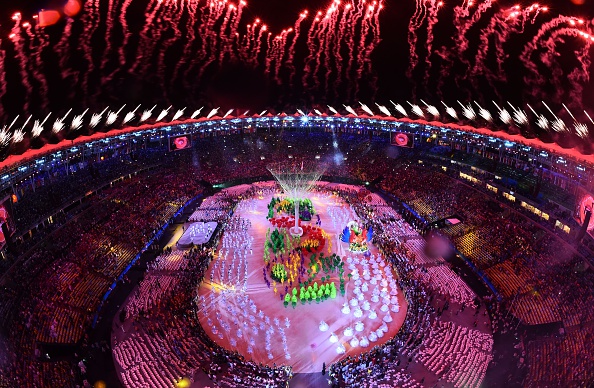From the Department of the Obvious: many if not most pre-Games reports of the 2016 Rio Olympics bore the tone of prophecies signaling the Biblical end of days.
From the same department: this did not happen.
It is now a week since the 2016 Games came to a close. Thus the logical follow-up question: why, before the August 5 opening ceremony, did Rio produce so many projections if not outright declarations of imminent doom?
And the corollary: going forward, isn’t it worth serious reflection and reconsideration from the many who predicted the sky would fall — not just about what they produced but about the role and value of the Olympics in our fragile world.
To be clear, the Olympics do not represent, nor have they ever, an exercise in perfection. That is not possible nor even in the least bit desirable. What the Olympics stand for is an appeal to our better selves and the notion of certain ideals, in particular friendship, excellence and respect.
To be even more clear, the Olympic movement is itself full of imperfections. This is natural. We are all human, and we are flawed. All the more so the International Olympic Committee.
Yet a Games produces a moment — 17 days, really — when athletes from all over the world, young people in the main, gather and don’t kill each other. This is not meant to be glib. The timeline of human history is replete with conflict over connection. The Olympics provide a way and a means for all of us to explore the things we have in common rather than exploiting our differences.
This is a unique thing in the annals of the human experience. It is worth celebrating.
And yet.
The IOC for sure can, and should, do a better job both of acknowledging its shortcomings and of explaining the constructive things it does, and why. Bid committees, and the follow-on organizing committees, absolutely can and should be held accountable when they over-promise and under-deliver -- see, for instance, the Rio 2016 bid's assertion that it would clean up the local bays and beaches.
Of course, it's news -- appropriately so -- when the oceanfront bike path in Rio collapsed because of high surf, killing two people.
In that spirit, it's also more than legitimate to observe that infrastructure projects in Rio, and in other recent Games cities, were either designed to or in practice have benefitted primarily the affluent. Too, Olympic-related projects have often seen the authorities push people out of their homes. Here is a key example where bid and organizing committees -- pushed by the IOC -- ought to be on the hook from the get-go, required to state in bidding documents what, if any, relocations will be required to deliver promised construction.
For all that:
No one likes criticism, least of all my colleagues, friends and otherwise in the media.
But — to the collective you:
Your scare stories were absurd. Your level of expectation: ridiculous. Your predictions of far-reaching calamity: 100 percent wrong.
The developed world’s assessment and pre-Games judgment of developing Brazil smacked, in many instances, of smug privilege if not the very worst strands of colonialism and imperialism. Why expect Rio to be London or Vancouver?
Social media amplified the predictions of catastrophe. A threat on Reddit was dedicated to the “Apocalympics.”
Consider the Zika thing — which, among other consequences, purportedly led to the withdrawal of many top male golfers from golf’s debut at the Olympics.
The World Health Organization said last Thursday that no one appears to have caught Zika at the Games. That means, according to WHO, “spectators, athletes or anyone associated with the Olympics.”
To be even more direct — not one worker at the Rio golf grounds.
Yet the world’s top guy pros wouldn't or couldn’t go?
Hello, everybody — when did it dawn on you that August in Brazil is like February in the northern hemisphere and the mosquito populations in Rio would be way, way down? I was in Rio from July 28 through August 22 and literally did not see, hear or feel even one mosquito.
For that matter — what of the onset of the virus in Puerto Rico? Or South Florida?
As an entirely reasonable pre-Games CBC story pointed out, there was entirely more risk in Rio from street crime, getting hit by a bus or developing a sexually transmitted disease than from Zika.
Translation: life. Like being out and about in any big city anywhere.
Would you know that from the hysteria level of the reportage?
Which leads, in a direct line, to this kind of abject stupidity from the likes of U.S. women’s soccer team goalie Hope Solo:
To be clear, accounts of this challenge or that attending an edition of the Olympic Games have been a constant for more than a century. So that’s hardly new.
Twelve years ago, things before the Athens Olympics were in such a state of unease — the first post-9/11 Summer Games — that the Los Angeles Times, where I was then a staff writer, ordered us all to undergo gas-mask and terrorism-response training before flying to Greece.
As if journalists were suddenly going to become first-responders.
Even by Athens standards, however, what was new this time was both the depth and the breadth of it all — the sustained ferocity of the pack and its collective narrative.
Many people don't like change and, by extension, anything new. These were the first-ever Games in South America. A therapist might say these Games represented a variation on the classic "other" -- a source of concern, if not fear, since the dawn of time.
As Oliver Holt of the British outlet Mail on Sunday (his reporting was thoroughly reasonable throughout) observed in a Twitter post:
https://twitter.com/OllieHolt22/status/764523895777009664
Consider the 90-minute HBO “Real Sports” evisceration of the IOC.
Here was the opening sentence of an early July opinion piece in the New York Times:
“It’s official: The Olympic Games in Rio are an unnatural disaster.”
Here was, as the promo blurb for his new book about the Olympics called him, “the renowned sportswriter” David Goldblatt, on July 26 in the Guardian:
“In the face of such multiple disasters and injustices, history seems to offer Rio wriggle room. It can claim that Athens was more last minute and produced more white elephants, Sochi was as least as corrupt and wasteful, Beijing was more repressive, Seoul’s displacements were more widespread and viscous and Atlanta’s social cleansing more thorough. However, Rio is giving all of them a run for their money and adding its own unique injustices and shameful dissembling.”
Here was a history professor in the July 19 issue of Time magazine:
“The Rio Games will be a failure, no matter how successful they might be in terms of athletic accomplishment and spectator enjoyment, because our global sense of an international order has failed. It is a divided, distracted and even defeated international community that is slouching towards Rio.”
Do the Olympics deserve scrutiny? For sure. And for emphasis: journalistic responsibility and holding accountable those in positions of authority is wholly appropriate.
But — what’s also appropriate in the big picture is a more appropriate measure, please, of balance and perspective.
The New York Times' Chris Clarey, in a column published last Friday, summed up aptly:
"Rio deserved a more balanced, less hysterical prologue, just as it deserves a more balanced, less triumphal epilogue."
Is it realistic to expect an Olympic Games to solve every social problem in successive cities? Not in the slightest. The better question: why is that the question in the first instance?
A fair judgment on any Olympics takes 20 years. Look at Barcelona before 1992, and now. The place is totally transformed.
Athens has a ways to go before history can be in any way fair in rendering a verdict on those 2004 Games. Are there sports facilities that are just sitting now in the sun? For sure. At the same time, did the Games bring a new airport and new metro lines — and have they enhanced life, generally speaking?
Same in Rio. New transport lines. New waterfront park makeover. As the New York Times observed in a story published last Sunday, Rio "is altered if not reborn."
In the meantime, it's a real question why the ladies and gentlemen of the press, who are free with criticism when it's someone else, don’t do the one thing they ask of the people they cover — that is, to be consistent.
Examples:
How many stories were produced before the Sochi 2014 Games about Russia’s anti-gay propaganda law? And after?
How many reports were published before the Beijing 2008 Games about China’s human rights record? And after?
The good news about Rio is not just that disaster was, in fact, averted. It’s not even that a whole bunch of people wrote “gee, I guess that was OK” stories upon their Rio departures.
It’s that Rio has confirmed for increasing numbers within the IOC the realization, after 30 years of the Games as catalyst for wholesale public-policy makeovers, that it really is in a different game. It’s not in the infrastructure business. It’s in the inspiration business.
The consequence: the IOC needs — not should, but needs — to go for the 2024 Games to a city where the sports venues, the transport, the overall logistic package already exist. Essentially, this means either Paris or Los Angeles. Rome and Budapest are also in the race. The IOC will pick next September.
The IOC is recalibrating.
Time for the press to do the same.







